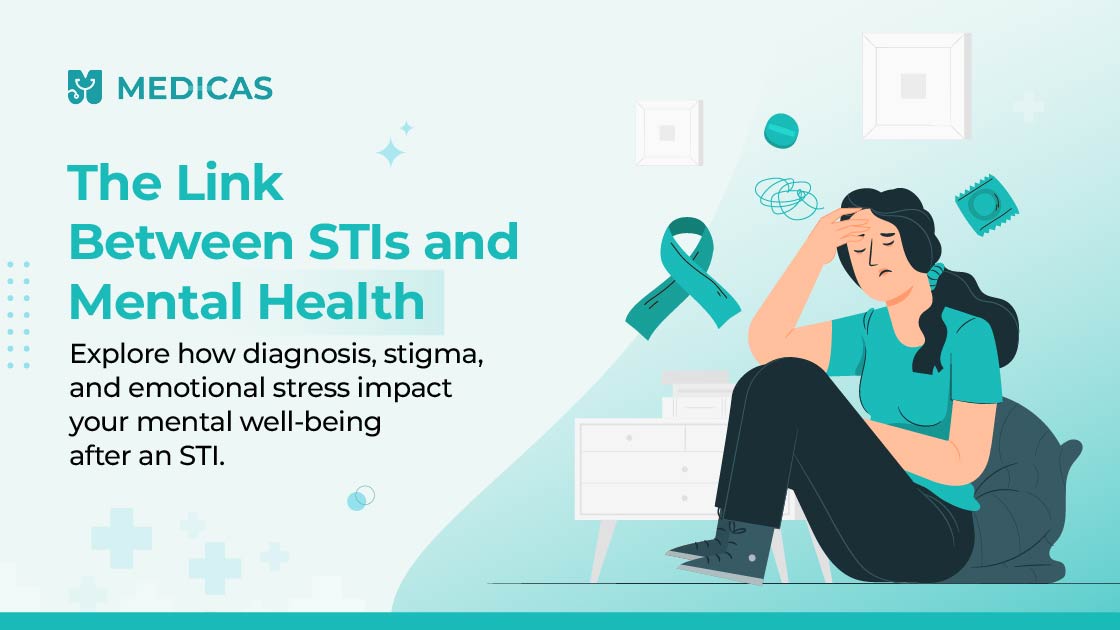Receiving an STI diagnosis can feel like a shadow falling over your life, carrying not just physical symptoms but a heavy emotional weight—fear, shame, and a sense of being utterly alone. In India, where STIs are already a taboo topic, this stigma is magnified, often preventing people from seeking the right treatment, let alone addressing the added burden of mental health challenges. The silence around STI mental health can make you feel like you’re carrying an invisible load, but trust me, as a doctor, I understand what you’re going through, and so do countless healthcare providers ready to support you with compassion. The intersection of STI mental health deserves open, empathetic discussion, especially in India, where over 6% of the adult population is estimated to have an STI at any given time, and cultural taboos intensify the psychological effects of STIs. This comprehensive guide explores mental health and STDs, from depression after STI to anxiety from STI, offering practical steps for coping with mental health issues after STI and resources like online mental health support for STI patients. Whether you’re wondering how STIs affect your mental health or seeking tools like booking therapy, I’m here to provide clarity and hope. Let’s dive into understanding this connection and walk this path together toward healing.
What Are Sexually Transmitted Infections (STIs)?
Sexually transmitted infections are infections passed through sexual contact, affecting millions globally. In India, cultural silence around STIs often delays diagnosis and treatment, amplifying their emotional impact. Understanding STIs is the first step to addressing both physical and STI mental health concerns.
Common Types of STIs
Common STIs include chlamydia, gonorrhea, syphilis, herpes, HIV, and HPV. Each has unique symptoms and treatments, but all can influence mental health and STDs. For example, herpes may cause recurring outbreaks, contributing to anxiety from STI, while HIV carries significant stigma around STIs.
How STIs Are Diagnosed and Treated
Diagnosis typically involves blood tests, urine samples, or swabs, available through lab testing services. Treatments range from antibiotics for bacterial STIs to antivirals for viral ones. Early intervention reduces complications but doesn’t always address the psychological effects of STIs, which we’ll explore further.
The Stigma Around STIs
The stigma around STIs in India is profound, often rooted in misconceptions about morality or hygiene. Patients tell me they fear judgment from family or partners, which fuels depression after STI or anxiety from STI. Breaking this stigma is key to supporting STI mental health.
The Mental Health Effects of an STI Diagnosis
An STI diagnosis can trigger a cascade of emotions, impacting STI mental health deeply. In my practice, I’ve seen how how STIs affect your mental health varies, but the emotional impact of STI diagnosis is universal, requiring compassionate care.
Depression and Anxiety Following STI Diagnosis
Depression after STI is common, with feelings of hopelessness or low self-worth. Anxiety from STI may manifest as constant worry about health or disclosure to partners. These psychological effects of STIs can disrupt daily life, making support essential.
How Stigma Contributes to Mental Distress
The stigma around STIs amplifies mental health and STDs challenges. Fear of being labeled or ostracized can lead to isolation, worsening depression after STI. In India, where community opinions carry weight, this stigma often silences those needing help.
Coping Mechanisms: What Works and What Doesn’t
Unhealthy coping, like denial or substance use, can worsen STI mental health. Effective strategies include journaling, talking to trusted friends, or seeking therapy after an STI diagnosis. I’ve seen patients find relief by addressing both physical and emotional needs.
Understanding the Emotional Burden of STIs
The emotional impact of STI diagnosis often includes shame, guilt, and fear, which can weigh heavily on STI mental health. Recognizing these emotions is the first step toward healing.
The Role of Shame and Guilt
Shame and guilt are common psychological effects of STIs, especially in cultures like India’s, where sexual health is taboo. Patients may feel they’ve “failed” morally, intensifying depression after STI. Acknowledging these feelings without judgment is crucial.
Why Emotional Support Is Crucial
Emotional support, whether from loved ones or professionals, mitigates anxiety from STI and depression after STI. Support groups or online mental health support for STI patients can provide a safe space to share and heal.
Psychological Therapy and Counseling Options
Seeking therapy after an STI diagnosis can transform STI mental health. Cognitive-behavioral therapy (CBT) helps reframe negative thoughts, while counseling addresses stigma around STIs. In India, access to therapists is growing, including via online platforms.
Strategies for Managing Mental Health After STI Diagnosis
Managing mental health and STDs requires proactive steps. From mindfulness to building support, these strategies can help you navigate coping with mental health issues after STI.
Mindfulness and Mental Health
Mindfulness practices, like meditation or deep breathing, reduce anxiety from STI. Apps or guided sessions can be part of online mental health support for STI patients, offering tools to stay grounded.
Building a Support System
A strong support system—friends, family, or support groups—eases the emotional impact of STI diagnosis. In India, where family plays a central role, confiding in trusted loved ones can lighten the burden of STI mental health.
Seeking Online Mental Health Support
Online mental health support for STI patients is a game-changer, especially in rural India. Virtual therapy or support groups provide privacy and access, helping you address depression after STI or anxiety from STI. Explore options at this link.
When to Consult a Professional
Knowing when to seek professional help is vital for STI mental health. If psychological effects of STIs persist, professional support can make a difference.
Tips for Talking to a Therapist About STI-Related Issues
Be open about your emotional impact of STI diagnosis when seeking therapy after an STI diagnosis. Share fears, shame, or stigma around STIs—therapists are trained to listen without judgment. Prepare questions to feel empowered during sessions.
How Online Doctor Consultations Can Help
An online doctor consultation can address both STI treatment and mental health and STDs. I’ve seen patients benefit from discussing anxiety from STI or depression after STI in a private, accessible setting.
Preventing the Cycle: Education, Awareness, and Prevention
Breaking the cycle of STI mental health challenges involves education, awareness, and prevention. By reducing stigma around STIs, we can foster healthier conversations.
Reducing STI-Related Stigma Through Awareness
Public awareness campaigns in India are slowly shifting perceptions, but more is needed to combat stigma around STIs. Educating communities about how STIs affect your mental health normalizes seeking help for mental health and STDs.
The Importance of Safe Practices
Using condoms, regular STI testing, and open partner communication prevent STIs, reducing the risk of psychological effects of STIs. These practices also support coping with mental health issues after STI by minimizing new diagnoses.
Encouraging Open Conversations About STIs and Mental Health
Open dialogue about STI mental health in families, schools, and workplaces can dismantle stigma around STIs. Encouraging patients to share their emotional impact of STI diagnosis fosters empathy and support.
Pneumonia Vaccine Myths vs. Facts
Misconceptions about STI mental health can deepen distress and prevent help-seeking. Here’s a table debunking common myths to clarify the connection between mental health and STDs.
| Myth | Fact |
| STIs don’t affect mental health. | How STIs affect your mental health is significant, with depression after STI and anxiety from STI being common psychological effects of STIs. |
| Only “irresponsible” people get STIs. | STIs can affect anyone who is sexually active, regardless of lifestyle, contributing to the stigma around STIs. |
| Talking about STIs makes mental health worse. | Open discussions and seeking therapy after an STI diagnosis can alleviate emotional impact of STI diagnosis and improve STI mental health. |
| Mental health issues from STIs resolve on their own. | Coping with mental health issues after STI often requires professional support, like online mental health support for STI patients. |
| Therapy for STI mental health is shameful. | Seeking therapy after an STI diagnosis is a sign of strength, addressing depression after STI or anxiety from STI proactively. |
| Online therapy isn’t effective for STI mental health. | Online mental health support for STI patients is highly effective, offering privacy and access to manage mental health and STDs. |
| STIs only cause physical problems. | The psychological effects of STIs, including depression after STI and anxiety from STI, are significant and require attention. |
These facts empower you to seek online mental health support for STI patients without fear.
Conclusion
The journey through an STI diagnosis doesn’t end with physical treatment—it’s deeply intertwined with STI mental health. By understanding how STIs affect your mental health, addressing depression after STI, anxiety from STI, and the stigma around STIs, you can reclaim your well-being. In India, where cultural barriers often silence these conversations, resources like online doctor consultations, lab tests, and seeking therapy after an STI diagnosis make healing accessible. The emotional impact of STI diagnosis is real, but so is your strength to navigate it. Let’s break the silence around mental health and STDs and support each other toward a healthier future.
Frequently Asked Questions
- How do STIs affect your mental health? STIs can trigger depression after STI, anxiety from STI, and shame due to stigma around STIs, impacting STI mental health. Therapy and support help manage the psychological effects of STIs.
- What coping strategies help after an STI diagnosis? Mindfulness, building a support system, and seeking therapy after an STI diagnosis are effective for coping with mental health issues after STI. Avoid denial or isolation, which worsen mental health and STDs.
- Can I consult a doctor online for STI-related mental health concerns? Yes, online doctor consultations offer private support for STI mental health, addressing depression after STI or anxiety from STI with expert guidance.
How do I book an online appointment for STI and mental health counselling? Visit this link to schedule a virtual session for online mental health support for STI patients, discussing the emotional impact ofthe STI diagnosis confidentially.
Disclaimer
Medical Advice: The information provided in this blog post is for educational purposes only and should not be considered as a substitute for professional medical advice, diagnosis, or treatment. Always consult with a qualified healthcare professional for personalized guidance regarding your specific medical condition.
Accuracy of Information: While we strive to provide accurate and up-to-date information, the field of medicine and viral fevers is constantly evolving. The content in this blog post may not reflect the most current research or medical guidelines. Therefore, it is advisable to cross-check any information provided with reliable sources or consult a healthcare professional.
Individual Variations: The symptoms, causes, treatment options, and preventive measures discussed in this blog post are general in nature and may not apply to everyone. It is important to remember that each individual’s situation is unique, and personalized medical advice should be sought when making healthcare decisions.
External Links: This blog post may contain links to external websites or resources for additional information. However, we do not endorse or have control over the content of these third-party websites. Accessing these links is done at your own risk, and we are not responsible for any consequences or damages that may arise from visiting these external sources.
Results May Vary: The effectiveness of treatment options or preventive measures mentioned in this blog post may vary from person to person. What works for one individual may not work the same way for another. It is essential to consult with a healthcare professional for personalized advice tailored to your specific needs.



